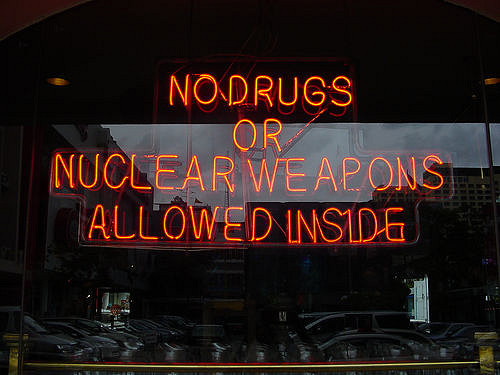The argument for nuclear disarmament could not be better expressed than the words: Donald Trump versus Kim Jong-Un. You don’t have to take a side because your side has already taken you. You’ve been conscripted into a potential conflict no one can control.
Yet this is nothing new. North Korea has been pursuing the same strategy for 25 years. The purpose of the missile tests is to show that the Kim regime is capable of taking on the US if a war breaks out on the peninsula. The US and South Korea carry out joint military exercises, so North Korea responds with its own threatening behaviour. It’s a classic tit-for-tat scenario.
There have been many instances of this since the early 1990s, and there have also been deals over that time period. The Clinton administration cut a deal with Kim Jong-Il to halt the nuclear programme, in exchange the US pledged to end its own provocative exercises on the Korean peninsula. This was back in 1994, more or less, upheld for the best part of a decade. It fell apart in 2002 when George W Bush famously classed North Korea as part of the so-called ‘axis of evil’.
So the US administration turned up the heat and Kim Jong-Il responded with more missile tests. The North Korean strategy is to push for a quid pro quo, where both sides would de-escalate and the regime would be guaranteed its survival. However, it’s doubtful that the world powers want to see the regime disappear either.
Russia and China are quite happy to use North Korea as a buffer state to US military bases and neither state wants to deal with the fallout of regime collapse. Likewise, South Korea does not want to shell out the billions it would need to reunify the peninsula (neither does the US) and Japan does not want another long-term economic rival in the form of a reunited Korea.
At the same time, the UN sanctions merely serve to hold back economic development in North Korea and ultimately increase the dependency of the people on the state. This is why the Kim dynasty can reproduce itself. China and Russia are not going to withdraw support because they don’t want the trouble. In other words, the US either has to make concessions or prepare for war.
It would be easy to leave it at that, but the Korean crisis is just a part of an international failure to deal with nuclear weapons. The Non-Proliferation Treaty (NPT) was signed by 191 countries and obliged much of the world to use nuclear technology only for peaceful means. It also bound the nuclear club – the US, Britain, France, Russia and China – to gradually give up the nukes.
Almost 50 years later, the US has failed to take the lead in giving up its nuclear arsenal and none of the other world powers have done so either. Outside the NPT, Israel, India and Pakistan have all developed nuclear weapons and show no sign of giving them up any time soon. This is true of most states with nuclear weapons, with a few exceptions (such as Ukraine and South Africa).
The US and Britain consistently upgrade their nuclear capacity, even if they have slightly reduced the number of warheads. Meanwhile NATO has served as a framework for stationing nuclear weapons in countries like Turkey and Germany. Putting it simply, multilateralism has utterly failed to deliver. The case for unilateralism is stronger than ever, even if it is politically unpopular.
The nuclear powers refuse to disarm on the grounds that they need a deterrent (presumably to each other). But the main attraction is that the bomb serves as a license for aggression against other countries. The idea of nuclear deterrence is questionable because the bomb is a first-strike weapon and its defensive capabilities are limited. The point of having nukes is to threaten and bully others.
Some would insist this means the deterrent works because no two nuclear-armed states would ever consider taking each other one. In that case, the deterrent argument becomes the case for proliferation and not for disarmament. Every country in the world should have nuclear weapons, if this argument stands up to scrutiny.
It’s no coincidence that the same justification is used in every instance. Indeed, the arguments used by the NPT signatories are exactly the same as those used by powers outside of it. This includes Pakistan, India and Israel. No doubt, the North Korean regime sees the bomb as the guarantee of its long-term survival. The lessons of recent history make this clear: Iraq tried and failed to get nuclear weapons, the US invaded and overthrew the Ba’athist regime.
Of course, the pro-nuke crowd will reach for their own examples in a vain attempt to prop up their hopeless case. It’s common to hear Ukraine cited as a case where nuclear weapons could have deterred Russian aggression. But this is questionable for a number of reasons. For starters, nuclear weapons are useless in a civil conflict because such bombs cannot be deployed within the borders of the nuclear power itself.
Even if Ukraine threatened to use such bombs against Moscow, the threat of Russian separatism would remain. In fact, it would be exacerbated by such bluster. The case of South Africa reinforces this point. Apartheid ensured that the regime faced internal and external foes. The country was embroiled in bloody conflicts in Angola, Namibia and Mozambique. Once it became clear that South Africa could not go on waging such wars, the regime began to crumble.
The political dynamics of the situation determine the course of events much more so than the specific technology involved. But these subtleties so often go misunderstood in the debates staged on this issue. It is easy to accept the deterrent argument when you live in a country with nuclear warheads at its disposal, but we forget about the rest of the world so easily.
Photograph courtesy of Daniel Grosvener. Published under a Creative Commons license.





